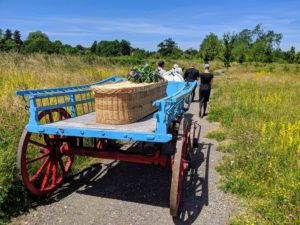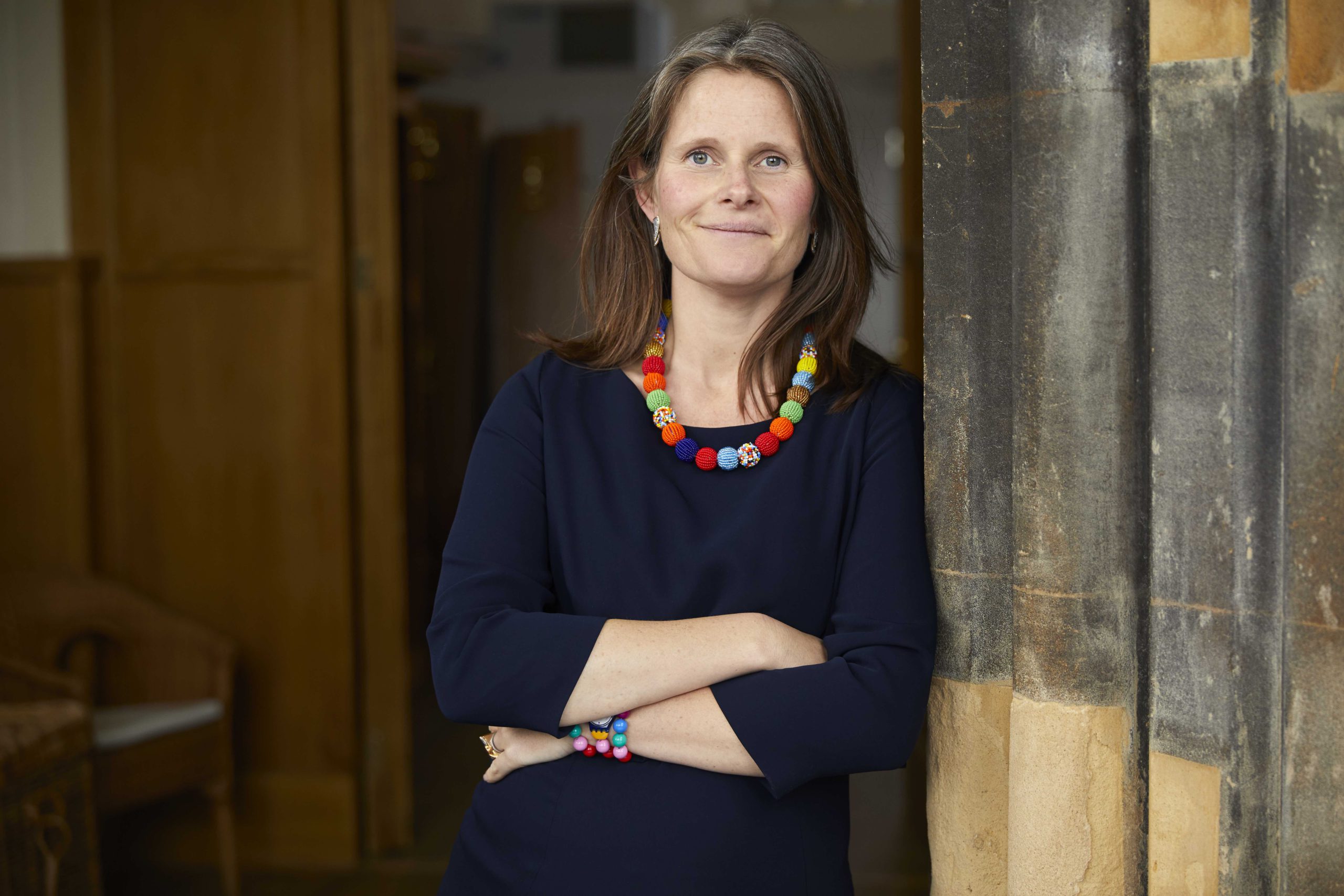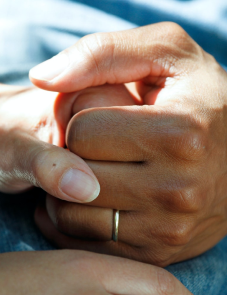Continuing Life Ledger’s series of conversations with people that are shaping today’s bereavement sector, we spoke to Poppy Mardall, the founder & CEO of the London-based funeral directory, Poppy’s.
LL: Tell us a little bit about your background and how you came to find yourself in the bereavement sector?
PM: I was a Deputy Director and expert in Modern British Art at Sotheby’s, I was around 26-27 and I had been working there for the last five years, after completing my degree in art history.
I would say that from the very beginning of my working career, I loved art and found different pieces really interesting, but then I had this other part of me which wondered, is art right for me? Is it meaningful to me? I wasn’t sure that I felt the same way about it as those around me did.
Now, I can sort of look back and say that they were all classic quarter-life crisis moments.
I was taking that secondary feeling and using it to shape my spare time. I volunteered as a Samaritan for a few years and then I became a volunteer at Trinity Hospice, as one of their home visiting volunteers. Eventually, I felt like, ‘I must make that stuff, my work, whatever it is.’
And so then I went through a year or two of not really knowing what that would mean for a career. I decided to take some time off work to figure it out. So, I saved some money and I took three months off work. Then, I went to west Africa, just to travel, and I got typhoid. I was ill for quite a long time, which was bad both financially and spiritually.
But then, at the same time, there was something very good about that situation. It just swept away that whole sense of, ‘What am I going to do next? What does everyone else think?’. Those silly superficial worries were gone, and I was left tootling about on the internet recovering at home, with a much wider scope of consideration for what I might do next.

LL: So how did Poppy’s start?
PM: After a bit of researching and sending work experience enquiries, a couple of London funeral directors kindly let me spend some time assisting in the mortuary. It was really over that period that I decided to jump in with both feet.
The more I thought about it, the more I realised that what I felt people needed help with was the experience itself.
Spending time with those funeral directors, built up my confidence that my approach was the right one. I understood the need to get by the side of people, help them explore their options and provide an experience that would meet their needs and wants.
I started by launching Poppy’s in 2012 and – literally, all while working from my flat – I built a website, went to visit families in their homes and subcontracted some of the services from another funeral director.
And we grew from there. We started off by just offering what’s now known as direct cremation, and we were the first in London to do it. This was at a time where other funeral directors felt like that was something that they really couldn’t get their head round; dropping someone to the crematorium in a van, they really found that difficult.
At first, what we marketed was simple cremation (which is what people now know as direct cremation), but from day one, we had people calling saying, ‘You just look like our kind of people, can you do something else?’. That was a really lovely way to learn the craft, just being led by our clients asking the question and then thinking to ourselves, ‘Why can’t we do that?’.
LL: What is the main aim of Poppy’s?
PM: The purpose of Poppy’s is to create a world where client-centered, transparent, environmentally conscious death care is the norm.
And so we work towards that vision by delivering this principle on the ground. But, we also recognise that we can’t do it on our own. So another big part of our mission is to share what we do with others in the sector, to try to encourage people to be better in a sector which, I think, is definitely full of compassionate people, but is nervous about innovation or questioning the tradition of the service.
So, it’s very much about expanding our service delivery, so that as many people as possible can receive our excellent care. But, it’s also about taking the sector with us along the way.
LL: What’s been the biggest challenge that you’ve faced to date?
PM: For the first few years of Poppy’s, we grew pretty fast. At that point, we were hearing from people who didn’t know what they wanted, but they knew what they didn’t want.
Our customer base was people who’d either had a poor previous experience with a traditional funeral director, or those who just didn’t like the look of the sector. And they sort of landed in our laps without us having to work too hard.
However, what we’ve experienced over the last few years is that people within those groups are finite, and that they don’t represent the bulk of people. And so I think the greatest challenge we face, and we continue to face, is how do we get people to know that ‘good death care’ exists and to choose it? And I’d say probably even deeper than that, how do we get the message across that a meaningful experience around death is worth having? Because I think we live in a world where a lot of people just think, ‘Well, death is grim and awful.’
I liken it a lot to like going into an operation. You know this is going to be painful, difficult and possibly expensive, and the sooner you come out the other side, the better. But what we’re trying to propose is that, by having an experience which is meaningful to you, you will feel so much better for it.
This might mean an emotionally engaging experience, or it might just mean cheap or done quickly – we don’t have a view on what meaningful looks like, we just want to make sure that the experience is meaningful to every individual that comes through our doors.
And that’s the challenge. Once a client has used us, they entirely understand why it matters, but before they’ve used us, they don’t necessarily know that a good experience is even a thing.

LL: What do you feel have been your biggest successes to date?
PM: I think one of our biggest successes has been hiring from outside the sector, which is not really an easy thing to do. But the Poppy’s approach is to take a fresh approach to funerals, and I think that outside hiring achieves this through a fresh perspective.
What they don’t come with is a set of preconceptions that we then need to peel back. And that’s been really mega.
LL: Where would you ideally like to see Poppy’s in 10 years time?
PM: I see it quite clearly; I see us as being the biggest independent in London.
So I think what we will have done in 10 years time, if we get our nose to the grindstone and get it right, is have shifted the sense of what a good funeral looks like, to the extent that many more people choose us.
And through that, we will have impacted the sector at large, so that it continues to challenge itself, as consumers demand more transparency, while pushing the sector to be much more environmentally conscious.
Another one of our ambitions is to help better death technologies come to the UK. For example, Recompose is a process that allows the body to turn to soil much faster than a burial. A natural burial is also a wonderful option, but Recompose is a fabulous choice for people who might otherwise have considered cremation in the city. We’d love to be a huge part of bringing that to the UK and supporting other technologies as well.
LL: What do you feel is the biggest single single issue currently facing the death and bereavement sector?
PM: It’s definitely the fact that really the two only options people have are cremation and a traditional burial, neither which are good for the planet
Cremation currently uses a significant amount of fossil fuel. What’s more, it doesn’t do anything useful with the body. Ashes don’t feed the planet in any way, and traditional burial means that you’re buried pretty deep, often in a plastic-lined coffin made of MDF.
Of course we fully support our clients to make those choices, but what I’m really aware of is that there are no other choices.
There’s natural burial, which is a really wonderful choice, but there aren’t enough natural burial grounds for most people to feel like there’s a local choice for them.
I think we need to quickly address the impact that current burial options have on the planet. Natural organic reduction is a great choice, which is currently being practiced in the Northwest coast of America. But beyond that, there are other options to explore. For example, alkaline hydrolysis is a process where the body is put in an alkaline solution and effectively dissolved, as an eco-conscious alternative to cremation.
It worries me because there are people in the sector who want change, but it is a particularly traditional sector and I’m not really confident that, right now, we have the planet-conscious innovation-focused culture within the sector that we need to welcome those things in.
LL: Which other organization, organizations or individuals really impress you in the sector?
PM: Katrina Spade who set up Recompose is a total pioneer.
I’ve watched with admiration as she both captures the hearts and minds of the general public, whilst working with faith communities and the funeral sector at large to try and bring people with her. Her mission is to bring human composting to the world, which is just amazing, big and brave, and she really inspires me.



